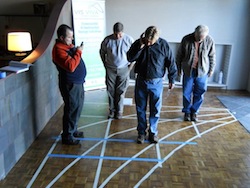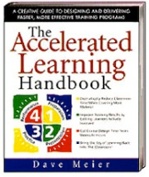Energy Auditor Training: Caveat Emptor

 Let’s take a look at this saying that some people take as truth: Those who can, do, and those who can’t, teach. You know it’s a lie, right? Not only does it show arrogance and complete misunderstanding of what teaching is all about, but it also seems to imply that if you’re a doer, you’d naturally be a good teacher.
Let’s take a look at this saying that some people take as truth: Those who can, do, and those who can’t, teach. You know it’s a lie, right? Not only does it show arrogance and complete misunderstanding of what teaching is all about, but it also seems to imply that if you’re a doer, you’d naturally be a good teacher.
Let’s take a look at this saying that some people take as truth: Those who can, do, and those who can’t, teach. You know it’s a lie, right? Not only does it show arrogance and complete misunderstanding of what teaching is all about, but it also seems to imply that if you’re a doer, you’d naturally be a good teacher.
That seems to be the underlying assumption behind many training programs for weatherization, home energy raters, and other energy auditor certifications. An organization—or even just a person in the case of some of the scam certifications out there—figures out how to do something, and then the folks who have been doing it, go out and start teaching.
In many cases, the kind of teaching they do is what they recall of the teaching they had in school. Teachers stand in front and perform. Students sit in their desks and listen to the teacher. In many of these classes, the term that seems to be a good description of the process is Death by PowerPoint.
That’s not education!
We learn by doing. Yes, we do need to see modeling of the things we learn, but when all that happens is a teacher standing in front throwing information at students, it’s a tremendous waste of time. Just because the training material is being delivered doesn’t mean it’s being received. I’ve written about this before here in the Energy Vanguard blog, most comprehensively in my article, Home Energy Rater Training — A New Approach.
My friend Steve Byers, CEO of Energy Logic, likes to refer to some of the worst perpetrators of this style of teaching as training mills. They take their PowerPoints on the road and throw someone in front of the class to read the slides to the students. I’ve heard many reports, mostly not good, from students who’ve been through those classes.
Real learning
In the ’80s, I read just about every book on alternative teaching methods I could find: Summerhill by A.S. Neill, The Open Classroom by Herb Kohl (whom I had the pleasure of visiting at his home in ’88), How Children Learn and How Children Fail by John Holt… It all made so much sense. Basically, what they were saying is that people have to be involved in the process of learning. Sitting and watching has a low level of involvement.
Now, in teaching adults, I’ve found  another great resouce, and I’ll share it with you here. If you have anything to do with teaching adults in any kind of course, you should buy a copy of The Accelerated Learning Handbook by Dave Meier right now. In it, Meier describes how to use activities that activate all learning styles (somatic, auditory, visual, and intellectual) and how to allot training time to the four areas of preparation, presentation, practice, and performance. It’s a great resource based on research into how the brain works and what kinds of activities are most effective.
another great resouce, and I’ll share it with you here. If you have anything to do with teaching adults in any kind of course, you should buy a copy of The Accelerated Learning Handbook by Dave Meier right now. In it, Meier describes how to use activities that activate all learning styles (somatic, auditory, visual, and intellectual) and how to allot training time to the four areas of preparation, presentation, practice, and performance. It’s a great resource based on research into how the brain works and what kinds of activities are most effective.
The good news is that things are changing in our field. Some organizations understand that it’s not good enough to have someone who’s done a thousand home energy ratings stand in front of the class and tell the students how to do it. RESNET even instituted a requirement that all certified HERS trainers must take a two day class in adult education.
The shift is happening, and training classes are improving. As always, though, there will still be bad programs and bad instructors out there , so my advice to anyone looking for a class to get certified as a HERS rater, BPI building analyst, or other type of home energy pro is: Caveat emptor, which means let the buyer beware. Do your research before signing up for any class.
Now, going back to that saying I opened with, I’m going to give Taylor Mali the last word. He’s a teacher and doesn’t mince words. (There’s a bit of strong language here, so you might want to skip the video if that bothers you.)
If you’re interested in taking a home energy rater class, Energy Vanguard has one of the best pass rates in the US. Our pass rate in 2012 was 95% and we’re at 91% since we began training in 2010.
This Post Has 2 Comments
Comments are closed.


Nice Message Allison. I
Nice Message Allison. I “get” your passion. My take is that the best teacher in the world can’t transform a person with no building knowledge into an energy auditor, or rater, in 5 days, or 10 days, or maybe any number of days, and with one course. From what I can see, there isn’t much concern for qualifying prospective students for these courses, which would turn some number away, or redirect them to more appropriate preparatory training. And that’s not good for the bottom line, which is, after all, the way our businesses are judged. So, training is provided to some who can’t apply it. Unfortunately, some believe they really are qualified to do the job, and the result is we all suffer when a poor job is done. We still deal with the guy who set up a website to braodcast that all raters are cheaters because of the actions of one of us. I read a recent post on one of the forums by a new auditor asking for guidance on how to deal with a very basic issue; proof that they aren’t qualified, but they’re out there “doing the job.” You know all too well that the lawyers are salivating, waiting for this baby “industry” of ours to provide them with a new source of income. And, we all should know that poor quality work results in possible personal safety hazards to our clients, and definite harm to their wallets.
Keep up your passion for doing it right.
Stan:
Stan: Great points! Even teaching the class in 8 days, as we do here at Energy Vanguard, isn’t enough. Ideally, the schools and colleges that teach builders, HVAC technicians, architects, and engineers will convey all this knowledge to their students and give them the hands-on experience they need as well, and they’ll do it over months or years, rather than days.
Until then, we’re stuck with the system we have, and the problems that result from it. And people like you and me will have to keep speaking out and educating others so we can raise the quality of work being done in people’s homes.